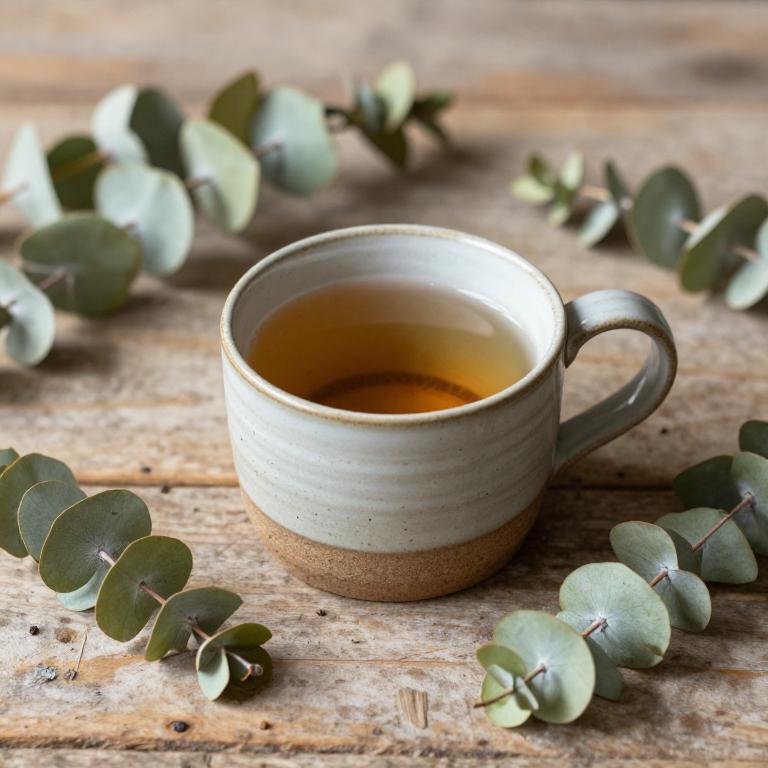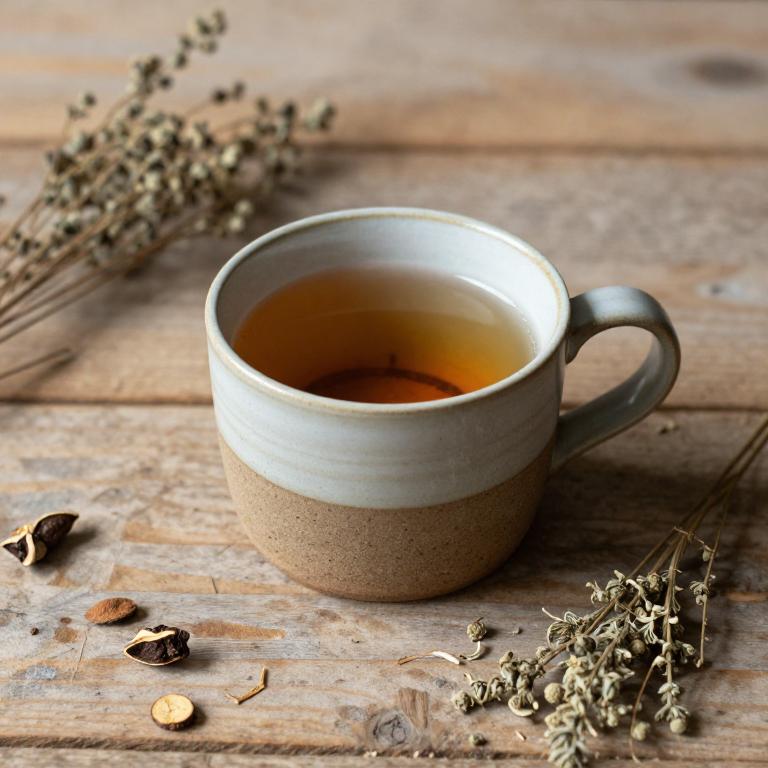10 Best Herbal Teas For Chronic Bronchitis

Herbal teas can be a natural and supportive complement to conventional treatments for chronic bronchitis, offering anti-inflammatory and antioxidant properties that may help reduce airway irritation and mucus production.
Commonly used herbs such as ginger, turmeric, eucalyptus, and licorice root are known for their ability to soothe respiratory symptoms and enhance lung function. These teas can be brewed at home using fresh or dried herbs, and they are generally safe for most people, though they should not replace prescribed medical treatments. However, it is important to consult with a healthcare provider before incorporating herbal remedies, especially if you have underlying health conditions or are taking other medications.
Regular consumption of certain herbal teas may contribute to overall respiratory wellness and help manage the symptoms of chronic bronchitis more effectively.
Table of Contents
- 1. Eucalyptus (Eucalyptus globulus)
- 2. Thyme (Thymus vulgaris)
- 3. Rosemary (Rosmarinus officinalis)
- 4. Ginger (Zingiber officinale)
- 5. Ceylon cinnamon (Cinnamomum verum)
- 6. Chamomile (Matricaria chamomilla)
- 7. Salvia (Salvia officinalis)
- 8. Chaste tree (Vitex agnus-castus)
- 9. Peppermint (Mentha piperita)
- 10. Stinging nettle (Urtica dioica)
1. Eucalyptus (Eucalyptus globulus)

Eucalyptus globulus, commonly known as the Tasmanian eucalyptus, is often used in herbal teas to support respiratory health, including in cases of chronic bronchitis.
The essential oils in eucalyptus leaves, particularly cineole, have anti-inflammatory and decongestant properties that may help ease breathing and reduce mucus buildup. Herbal teas made from eucalyptus globulus can act as a natural bronchodilator, helping to open airways and alleviate coughing. However, while some studies suggest potential benefits, it is important to consult with a healthcare provider before using eucalyptus tea as a treatment for chronic bronchitis, as it may interact with medications or not be suitable for everyone.
Overall, eucalyptus globulus herbal tea can be a complementary therapy when used alongside conventional medical treatments.
2. Thyme (Thymus vulgaris)

Thymus vulgaris, commonly known as thyme, is a popular herb used in herbal teas to support respiratory health, particularly in individuals with chronic bronchitis.
The tea is valued for its potent antioxidant and anti-inflammatory properties, which may help reduce bronchial irritation and ease breathing difficulties. Rich in compounds like thymol and carvacrol, thyme tea can act as a natural expectorant, helping to loosen mucus and clear the airways. While it is often used as a complementary therapy, it is important to consult with a healthcare provider before incorporating it into a treatment plan for chronic bronchitis.
Overall, thyme herbal tea may offer some relief from symptoms, though it should not replace prescribed medical treatments.
3. Rosemary (Rosmarinus officinalis)

Rosmarinus officinalis, commonly known as rosemary, is a herbal tea that has been traditionally used for its potential respiratory benefits.
This herb contains antioxidants and anti-inflammatory compounds that may help reduce inflammation in the airways, making it a possible supportive treatment for chronic bronchitis. Rosemary tea is often prepared by steeping fresh or dried leaves in hot water, and it can be consumed regularly to help alleviate symptoms such as coughing and shortness of breath. While it is not a substitute for medical treatment, some studies suggest that its essential oils may help clear mucus and improve lung function.
As with any herbal remedy, it is advisable to consult a healthcare professional before incorporating rosemary tea into a treatment regimen for chronic bronchitis.
4. Ginger (Zingiber officinale)

Zingiber officinale, commonly known as ginger, has been traditionally used in herbal teas to support respiratory health, including in cases of chronic bronchitis.
The active compounds in ginger, such as gingerol and shogaol, possess anti-inflammatory and antioxidant properties that may help reduce airway inflammation and mucus production. Drinking ginger tea can soothe irritation in the respiratory tract and provide relief from coughing and congestion associated with chronic bronchitis. It is often recommended as a complementary therapy alongside conventional treatments to enhance symptom management.
However, individuals with severe respiratory conditions should consult a healthcare provider before incorporating ginger tea into their regimen.
5. Ceylon cinnamon (Cinnamomum verum)

Cinnamomum verum, also known as true cinnamon, is often used in herbal teas for its potential therapeutic properties that may support respiratory health.
While there is limited scientific evidence directly linking cinnamon tea to the treatment of chronic bronchitis, some traditional practices suggest that its anti-inflammatory and antioxidant compounds may help reduce airway irritation and mucus production. When consumed as a warm herbal tea, cinnamon can soothe the throat and ease coughing, offering temporary relief from bronchial symptoms. However, it is important to note that cinnamon should not replace prescribed medical treatments for chronic bronchitis and should be used as a complementary remedy under the guidance of a healthcare professional.
Overall, while cinnamon tea may provide some comfort, further research is needed to confirm its efficacy in managing chronic bronchitis.
6. Chamomile (Matricaria chamomilla)

Matricaria chamomilla, commonly known as chamomile, is a herbal tea often used for its calming and anti-inflammatory properties.
While it is widely recognized for its soothing effects on the digestive system and sleep, some studies suggest it may also offer benefits for respiratory conditions like chronic bronchitis. Chamomile contains compounds such as flavonoids and essential oils that can help reduce airway inflammation and ease coughing. However, it is important to note that chamomile should not replace conventional medical treatments for chronic bronchitis and should be used as a complementary therapy under the guidance of a healthcare professional.
Overall, chamomile tea may provide some symptomatic relief for individuals with chronic bronchitis, though more research is needed to fully understand its efficacy in this context.
7. Salvia (Salvia officinalis)

Salvia officinalis, commonly known as sage, has been traditionally used in herbal teas to support respiratory health, including in cases of chronic bronchitis.
The plant contains bioactive compounds such as flavonoids and rosmarinic acid, which may help reduce inflammation and mucus production in the airways. While not a cure, sage tea may offer symptomatic relief by soothing irritation and improving breathing ease. It is often prepared by steeping dried leaves in hot water and can be consumed several times a day.
However, it is important to consult a healthcare provider before using sage tea as a complementary therapy for chronic bronchitis, especially for individuals with existing health conditions or those taking medications.
8. Chaste tree (Vitex agnus-castus)

Vitex agnus-castus, commonly known as chasteberry, is a traditional herbal remedy that has been used for centuries to support respiratory health.
While it is most widely recognized for its hormonal balancing properties, some studies suggest that its anti-inflammatory and expectorant qualities may offer potential benefits for individuals with chronic bronchitis. Herbal teas made from vitex can help soothe irritated airways and reduce mucus buildup, which are common symptoms of chronic bronchitis. However, it is important to note that vitex should not replace conventional medical treatments and should be used as a complementary therapy under the guidance of a healthcare professional.
As with any herbal supplement, it is crucial to consult a physician before incorporating vitex into a treatment plan for chronic bronchitis.
9. Peppermint (Mentha piperita)

Mentha piperita, commonly known as peppermint, is often used in herbal teas to support respiratory health, including in cases of chronic bronchitis.
The essential oils in peppermint, particularly menthol, have expectorant properties that help loosen mucus and ease coughing. Peppermint tea may also help reduce inflammation in the airways, providing relief from persistent bronchial irritation. Its cooling effect can soothe the throat and reduce the sensation of congestion, making it a popular remedy for those with chronic bronchitis.
However, while peppermint tea is generally safe, it should be used with caution in individuals with certain medical conditions or those taking specific medications.
10. Stinging nettle (Urtica dioica)

Urtica dioica, commonly known as stinging nettle, has been traditionally used in herbal medicine for its potential respiratory benefits.
When prepared as a tea, it is believed to help alleviate symptoms of chronic bronchitis by reducing inflammation and mucus production in the airways. The tea is rich in antioxidants and minerals that support immune function and may help ease breathing difficulties. However, it is important to consult with a healthcare provider before using stinging nettle tea, especially for individuals with existing health conditions or those taking medications.
While some studies suggest it may offer supportive benefits, more research is needed to fully understand its effectiveness for chronic bronchitis.